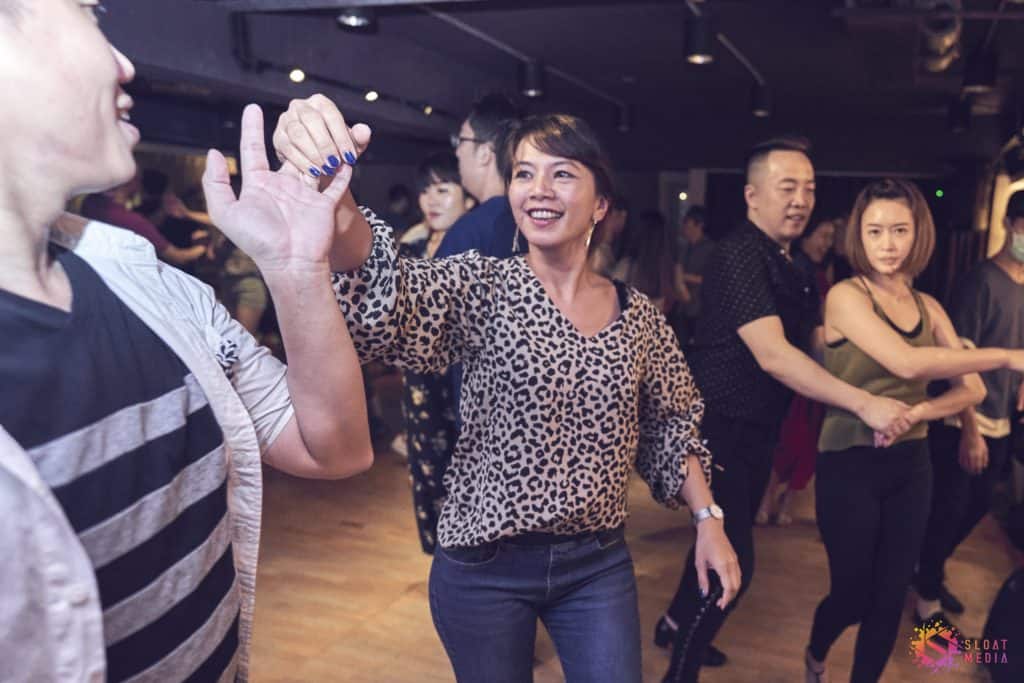Whether we dance salsa, bachata, zouk, or any other social dance, when we go to a party, we want others to enjoy dancing with us as much as we enjoy dancing with them, right? We want people to ask us to dance and accept our invitations willingly. Newer dancers often think that dance skill is the most important reason that people like to dance with each other. Not so! There are many factors that influence how dancers feel towards each other. Dance skill/experience is just one factor, and to develop that takes a lot of time and effort- going to classes, training alone and with partners, going to social parties and dancing a lot, etc. But there are other aspects of yourself that can improve (or worsen) the impression you make on other people in classes and parties.
- Practice good hygiene. So important. Smelling good and not being soaked in sweat goes a long way in making a good impression! Even if you are an awesome dancer, if you smell bad or your shirt is soaked through to your skin, many people will feel uncomfortable dancing with you. Before you go to dance, take a shower, change your clothes, and brush your teeth if possible. If that’s not possible, you can at least wear a clean shirt, wash your hands, check your teeth, and take some breath mints. And when you go to the bathroom, WASH YOUR HANDS WELL- as in, actually use soap! This should be a given, but I’ve seen enough to know otherwise. Does anyone want to dance sensual bachata or Brazilian zouk with someone who does not wash their hands? On the contrary, clean and dry hands will be noticed and appreciated.
- Be courteous and undramatic. If you want to dance with someone, ask them politely and wait for them to respond- don’t just assume that they will accept. If they say no or anything that sounds like they don’t really want to dance, just accept that with a smile and find someone else to ask. When the dance is over, thank them genuinely, but without holding onto them and preventing them from dancing with someone else. People appreciate being respected, and they are more likely to dance with you happily if your approach is relaxed and doesn’t make them feel pressured.
- Don’t talk when you dance. To me, one of the best parts of dancing is that we can communicate so much without talking. Very few people want to get to know you or tell you about themselves or talk about anything when they dance- they want to focus on dancing! If you can help to create enjoyable dance experiences with people, they will generally be more open to becoming more acquainted with you later, at a more appropriate time.
- Pay attention to your partner and be present in the moment. Make eye contact periodically (not all the time) and smile ,and don’t look around the room like you are thinking about something else or watching other people. It’s much more enjoyable to dance with someone who looks like they appreciate you being with them than with someone who seems to be in their own world. Another part of this is watching the crowd around you to help keep your partner and yourself safe. If you are the leader, keep an eye on who is around you and what they are doing so you don’t run your partner into another couple. If you are the follower and you see your leader about to run into someone, you can give him a look or tug on his hand to let him know that someone is in the way.
- Respect the organizers/venue and follow social norms. If you are going to a paid event, go pay right away- don’t make someone chase you down. Don’t complain and bring negative energy Don’t do things that you know you aren’t supposed to do just because you think you won’t get caught. Clean up after yourself and don’t leave your stuff in the way of other people. People will notice your behavior even if they don’t say anything. Basically, just be a decent person and treat the people around you with respect regardless of whether you need something from them now.
- Continue to improve yourself. When you are brand new, you may think that nobody wants to dance with a beginner, but it’s not true. Many (but not all) experienced dancers enjoy dancing with beginners at least once in awhile because many of us like to see new people joining the scene and discovering dance. We love to see people start as beginners and grow over time into more capable dancers. What tends to turn people off is when someone gets to a very basic level and then stays there, sometimes for years or even decades, without trying to learn anything new. We go to dance parties to have fun, and not everyone has time to go to regular classes, but if you go to parties often, do your best to make time to continue learning. This doesn’t mean you have to become an amazing dancer quickly- even if your progress is slow, your continued effort will be felt and will make a better impression. People will tend to appreciate and encourage you if they see that you are working on improving yourself to make dances more enjoyable for your partners!
As you can see, there are many soft skills involved in social dancing. Learning and experience is important, but being clean and treating people with courtesy and respect goes a long way. So remember these things while you are working hard to learn and become a better dancer- your dance scene will be a better place, and people will be happier to dance with you!
